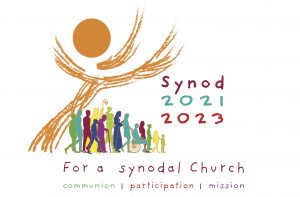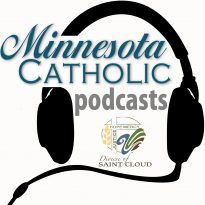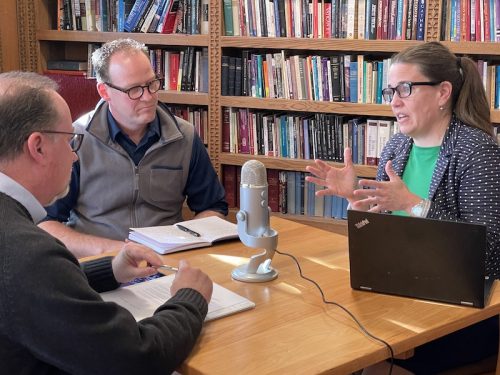The following interview about the churchwide synodal process opened by Pope Francis in October with its theme “For a Synodal Church: Communion, Participation, and Mission,” was recorded for Minnesota Catholic Podcasts. It features Kristin Colberg, associate professor of theology at St. John’s School of Theology and Seminary in Collegeville. She is the sole U.S. member of the synod’s international theological commission. The conversation also includes David Fremo, director of Catholic Education Ministries and coordinator of the local synod consultation process here in the Diocese of St. Cloud.
The version below has been edited for length and clarity. See below for information on how to listen to the full interview.
Q. Please briefly explain what a synod is and how this one coming up is different from Church synods in the past.

Kristin Colberg: A synod is really an ancient thing within the Catholic Church and it usually, in its simplest way, pertains to a meeting of bishops, where regional bishops will come together to make decisions. What’s interesting is that after the Second Vatican Council, the experience of these leaders from every diocese coming together was so fruitful, that at the end of it, Pope Paul VI decided that synods should be a more regular event in the Church. So at the heart of the synod we’re experiencing right now is that Pope Francis — on the 50th anniversary of Pope Paul VI instituting this process of synods — gave a very famous address [in 2015] about the importance of synods and this kind of listening and coming together. And that address is really what people point to as the seed of this gathering that we’re experiencing right now.
David Fremo: I would say, too, what was taken from the fruits of Vatican II and the Synod of Bishops established at that time was a perpetual way for the Church to continue on a path of renewal. Even to draw from “Lumen Gentium” (Vatican II’s Dogmatic Constitution on the Church) on this notion of the “people of God.” It’s foundational that the people of God collectively share the prophetic voice that they receive at their baptism. How do you honor that, and dignify that, if you don’t have a structure for it? So I think this is a practical way for what is believed, and what is taught, and what was experienced, especially in that council, to continue going forward as a key instrument for the Church to continually reflect on itself and be renewed as times would demand.
Q. So it sounds like we’re talking about a decision-making process. Is that what a synod focuses on?
David Fremo: Sometimes that’s the outcome, certainly. Pope Francis has, more than any of the popes since Vatican II, really used the process as a key way of thinking about the Church and having some synods that resulted in large statements about: What do we need to be thinking about? How can we do things differently? What have we learned in this process? And, probably more important than anything else, to include as many people as possible — to start with the people of God rather than, “This is a really important idea we’ve been thinking about in the Vatican. We’re just going to write this up and shoot it back down to you.” More than anything else, as you think about youth, as you think about the family, from the experience of those who are living within that, what are you seeing? What are you thinking about? What is the Spirit saying to you?

What’s compelling about this particular synod is that while there are clear targets set along the way — there’s a diocesan phase, there’s a continental phase where the bishops engage, and then there’s the phase in Rome with the Holy Father and then presumably ultimately some sort of a teaching document — it really is about getting at the heart of what synod means: the journey, the coming together that is so different about this. We don’t have a particular topic in mind. We have a set of topics, but it seems to me that the people of God and the relationship of all of the people of the Church is really the central looming topic over the whole thing, which is exciting and daunting at the same time.
Q. So when Pope Francis earlier this year asked for these consultations at the local diocesan level, is that different compared with past synods?
Kristin Colberg: So the word “synod” comes from “syn,” meaning “same,” and “hodos,” meaning “path.” It’s traveling on the same path. When we had synods previously that were largely gatherings of bishops, the bishops were representing their dioceses. So there was this sense that it is the people of God coming together, but in some ways represented by the leader. This synod is different in that we are asking for more consultation, more opportunities for contributions more directly from the laity. But what Pope Francis would say is that “synod on synodality” is not his creation. … He thinks that it’s — returning the Church to the most authentic version of itself, that it’s really going back to these early Christian communities that really did discern quite communally. The bishop might be leading the conversation, but there was a great sense of the unity of the group, the way that they functioned as a community. Pope Francis really sees this as something that’s drawing the Church deeply into its own identity.
Q. Professor Colberg, you’re on this theological commission assisting the synod. What was it like getting that news?
Kristin Colberg: I work on the international dialogue between the Roman Catholic Church and the Anglican Communion. I do quite a bit of work with them where I receive a lot of emails in the middle of the night, because they’re coming from Rome or they’re coming from London or Australia. I woke up and I got an email from the Vatican, and it read kind of strange because you get a note in Italian and then it’s followed by the same paragraph written in six different languages. I asked my husband if this could possibly be an invitation to be on the theological commission for the synod or just a very crazy version of spam. So I received this letter that I was being asked to serve on the theological commission. There’s 25 members on the commission. There are four women, and they represent very diverse countries and backgrounds.
Q. Are you the only U.S. theologian on that commission?
Kristin Colberg: I am. There is one other theologian who is from Venezuela, but teaches part-time at Boston College. But, yes, I am honored to be really the only theologian from the United States on that commission.
Q. What kind of work will you be doing with them? Do you have a clear understanding of that yet?
Kristin Colberg: Synods produce documents. There are multiple commissions that work with the synod. There’s a methodology commission, pastoral commission, communications commission, theology commission. We read each other’s documents, and we suggest ways that they could be clearer. We’re talking to everyone in the world. We want to be as clear as possible, as accurate theologically as possible. So [it involves] helping to produce the documents that come out of the synod and will ultimately be published. But also a large part of my job is consulting bishops in the United States and diocesan leaders as a resource person who can help people think about theological dimensions of synodality — a universal level and a national level. And I really want to be involved working with David on the diocesan level.
Q. So as we move through the next several months, people will be hearing more about the synod in a variety of places?
David Fremo: Yes, through our diocesan website (https://stcdio.org/synod-2021-2023), through The Central Minnesota Catholic magazine. There have been some wonderful articles already. We really want to be as transparent as possible. We will share with people: What are we hearing? What are some of the themes as we have consultations and opportunities for listening? We want people to see this is a dignified effort, that their time is worth it, that their voices are heard.
Q. What kind of impact would you like to see on the local Church and on the worldwide Church?
Kristin Colberg: I think it’s so exciting. Pope Francis would say this is not about creating structures. It’s about a conversion of the whole Church to its most authentic self. So I like to say sometimes that Pope Francis doesn’t like the noun “synod,” he likes the word “synodal.” It’s a way of being church. I think that what could come out of it is that people, through this listening and through this radical inclusion, could come to see the beauty of the Church and the relevance and the wisdom and the faith of the Church in a new way and get excited about it.
One of my favorite quotes I’ve heard in the last few years is that when Sebastian Gomes visited St. John’s campus — an alum who did the two very excellent documentaries on Pope Francis, “The Francis Effect” and “The Francis Impact” — he came and spoke to my class and he said, “When Pope Francis looks at the world, he doesn’t put on his goggles and look for Catholic problems in the world. He’s looking for human problems and how to help people be more fully human through faith in Jesus Christ and through the Catholic Church.” The synod is meant to help people be their best self, to help us be a community better together, to help us listen to one another. When I was in Rome, the most frequent thing I heard Pope Francis say was the purpose of synodality is to help us as a community discern: What is the Holy Spirit calling the Church to today?
//////////////
 LISTEN TO THE FULL INTERVIEW: with Kristin Colberg and David Fremo on Minnesota Catholic Podcasts. You can access the podcast by visiting TheCentralMinnesotaCatholic.org and clicking on “Minnesota Catholic Podcasts.” You also can subscribe to Minnesota Catholic Podcasts on iTunes or Google Play.
LISTEN TO THE FULL INTERVIEW: with Kristin Colberg and David Fremo on Minnesota Catholic Podcasts. You can access the podcast by visiting TheCentralMinnesotaCatholic.org and clicking on “Minnesota Catholic Podcasts.” You also can subscribe to Minnesota Catholic Podcasts on iTunes or Google Play.






















